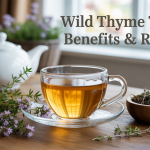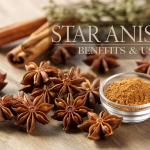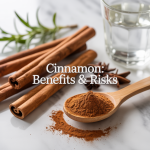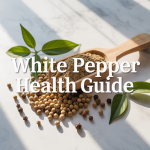Wild thyme tea has gained attention as a flavorful herbal drink that may offer surprising health benefits, but like any natural remedy, it comes with important considerations. This guide is perfect for herbal tea enthusiasts, health-conscious individuals, and anyone curious about adding wild thyme tea to their wellness routine.
We’ll explore the proven health benefits of wild thyme tea, including its antimicrobial properties and digestive support. You’ll also learn about potential risks and side effects that some people experience, plus safe consumption guidelines to help you enjoy this herbal tea responsibly. We’ll wrap up by comparing wild thyme tea to other popular herbal alternatives so you can make the best choice for your needs.
Understanding Wild Thyme Tea and Its Preparation Methods
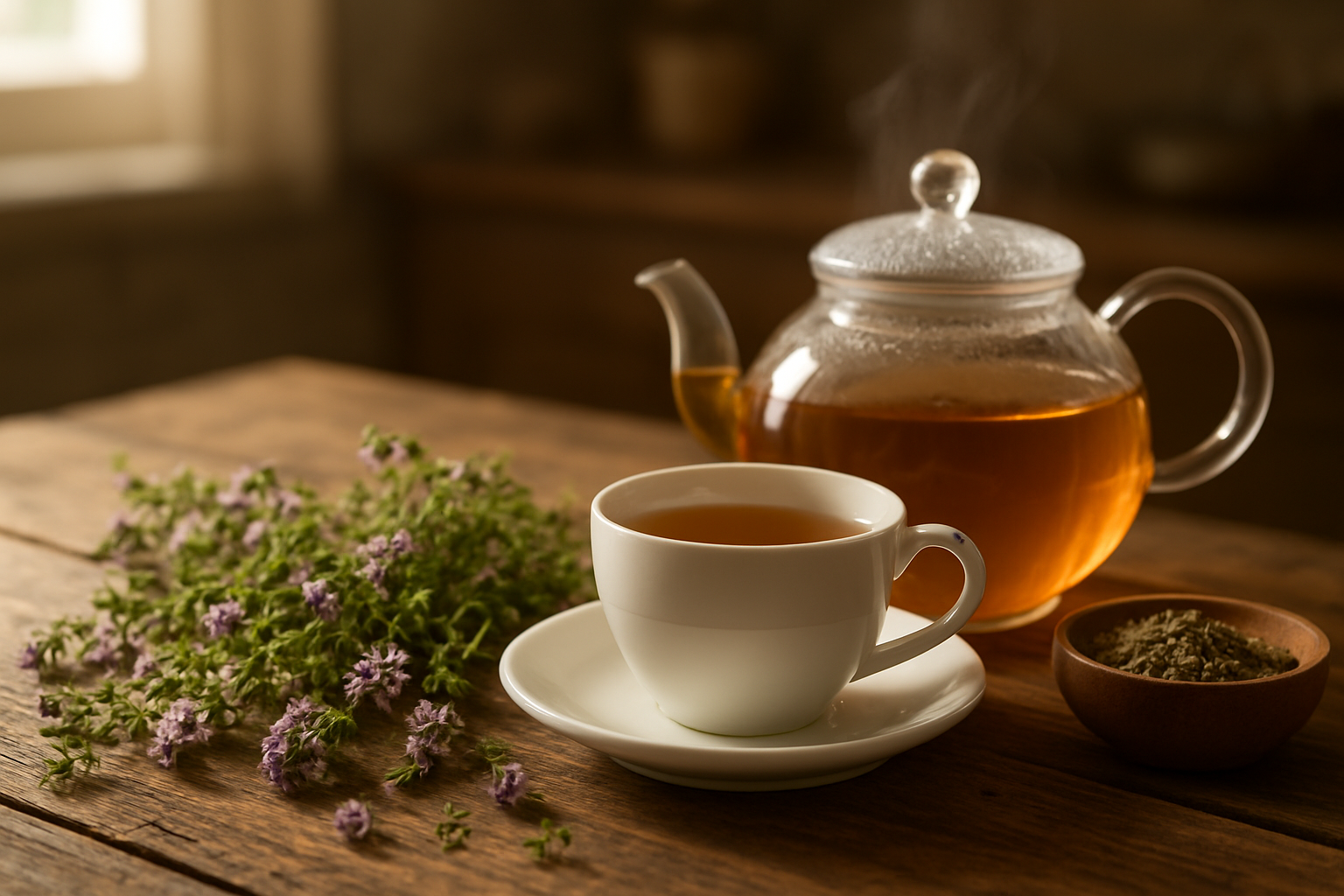
What Makes Wild Thyme Different from Regular Thyme
Wild thyme, scientifically known as Thymus serpyllum, grows naturally in mountainous regions and differs significantly from the common garden thyme (Thymus vulgaris) found in most grocery stores. This hardy perennial thrives in rocky, well-drained soils at higher elevations, developing a more concentrated flavor profile and higher essential oil content compared to its cultivated cousin.
The leaves of wild thyme are smaller and more densely packed with aromatic compounds, particularly thymol and carvacrol. These powerful compounds give wild thyme its distinctive sharp, almost medicinal taste that’s more intense than regular thyme. The plant’s purple-pink flowers add a subtle floral note to teas, creating a more complex flavor experience.
Wild thyme also contains higher levels of antioxidants, including rosmarinic acid and flavonoids, which develop naturally as the plant adapts to harsh mountain conditions. This stress response produces plants with superior therapeutic properties, making wild thyme tea potentially more beneficial than teas made from garden-variety thyme.
Traditional Harvesting and Drying Techniques
Timing plays a crucial role in harvesting wild thyme for tea preparation. The best collection period occurs just before flowering, typically in early to mid-summer, when the essential oil concentration peaks. Early morning harvesting, after dew has evaporated but before the day becomes too warm, preserves the maximum amount of volatile compounds.
Traditional harvesters cut stems about one-third of the way down the plant, leaving enough growth to ensure the plant’s survival and continued production. This sustainable approach has been practiced for centuries in Mediterranean and mountainous regions where wild thyme grows naturally.
For drying, the traditional method involves bundling small groups of stems together and hanging them upside down in a well-ventilated, dark area. Direct sunlight should be avoided as it can break down the essential oils and reduce the tea’s potency. The drying process typically takes 7-14 days, depending on humidity levels and air circulation.
Properly dried wild thyme should retain its color and aromatic properties. The leaves should crumble easily when touched but not turn to powder, indicating optimal moisture removal while preserving the plant’s therapeutic compounds.
Optimal Brewing Methods for Maximum Benefits
Water temperature significantly impacts the extraction of beneficial compounds from wild thyme. The ideal temperature ranges between 190-200°F (88-93°C), which is slightly cooler than boiling water. This temperature effectively extracts essential oils and water-soluble compounds without destroying heat-sensitive antioxidants.
Steeping time varies depending on desired strength and intended use. For a mild, daily drinking tea, 5-7 minutes provides a pleasant flavor without overwhelming bitterness. For therapeutic purposes, extending the steeping time to 10-15 minutes extracts more medicinal compounds, though this creates a stronger, more astringent taste.
The optimal ratio is approximately one teaspoon of dried wild thyme per cup of water, though personal preference may call for adjustments. Using filtered or spring water enhances the tea’s flavor profile, as chlorinated tap water can interfere with the delicate taste of the herbs.
Covering the cup or teapot during steeping prevents the escape of volatile essential oils, ensuring maximum therapeutic benefit. Some herbalists recommend gently stirring the tea halfway through steeping to encourage even extraction.
Selecting Quality Wild Thyme for Tea Making
Quality wild thyme should display vibrant green-gray coloration with minimal brown or yellow leaves, indicating proper harvesting and drying. The aroma should be strong and distinctive, with that characteristic sharp, medicinal scent that wild thyme is known for. Weak or musty odors suggest old or improperly stored herbs.
When purchasing wild thyme, look for suppliers who provide information about the harvest location and date. Mountain-grown wild thyme from Mediterranean regions typically offers superior quality compared to lowland varieties. Organic certification ensures the absence of pesticides and other chemicals that could compromise the tea’s purity.
Proper storage maintains quality over time. Wild thyme should be kept in airtight containers away from light, heat, and moisture. Glass jars with tight-fitting lids work well, storing the herb in a cool, dark pantry or cupboard. Properly stored wild thyme maintains its potency for up to two years, though using it within one year ensures optimal flavor and therapeutic benefits.
Avoid pre-ground wild thyme when possible, as whole leaves and flowers retain essential oils better than powdered forms. The texture should be crisp and dry, with no signs of moisture or clumping that could indicate poor storage conditions or potential mold growth.
Proven Health Benefits of Wild Thyme Tea
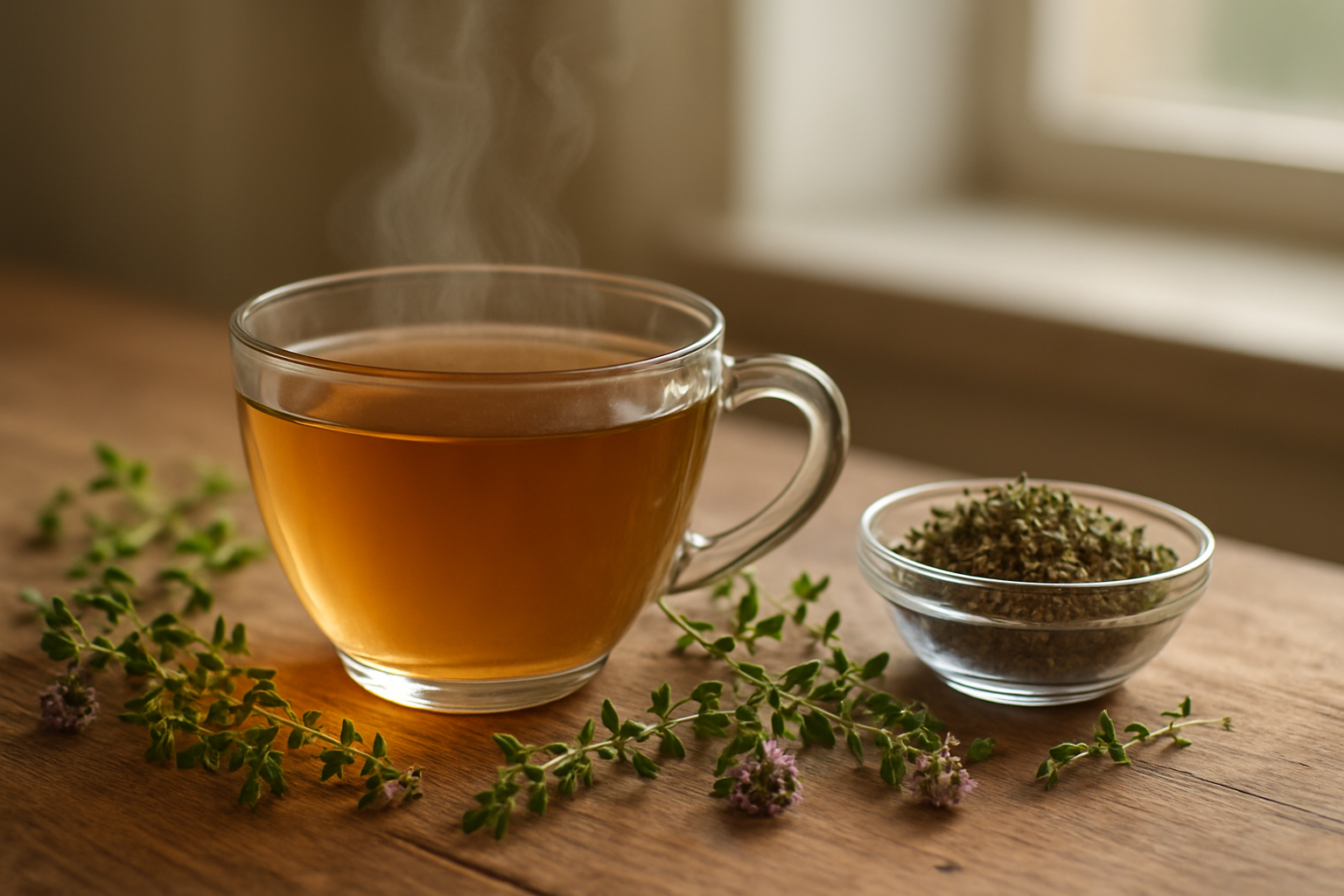
Powerful Antimicrobial and Antibacterial Properties
Wild thyme tea contains high concentrations of thymol and carvacrol, two compounds that pack a serious punch against harmful bacteria and microorganisms. These natural compounds work by disrupting bacterial cell membranes, making wild thyme tea an effective ally in fighting various infections.
Research shows that thyme’s antimicrobial properties can help combat several strains of bacteria, including Staphylococcus aureus and Escherichia coli. Regular consumption may support your body’s natural defense mechanisms against common bacterial infections. The tea’s antimicrobial action extends beyond bacteria to include certain fungi and viruses, making it a versatile natural remedy.
Many people find wild thyme tea particularly helpful during cold and flu season. The antimicrobial compounds can help reduce the severity and duration of minor infections, while supporting overall immune function.
Respiratory System Support and Congestion Relief
Wild thyme tea serves as a natural expectorant, helping to loosen and clear mucus from the respiratory tract. The herb contains compounds that relax bronchial muscles and reduce inflammation in the airways, making breathing easier during congestion.
The tea’s antispasmodic properties help calm persistent coughs, particularly dry, irritating coughs that disrupt sleep. Steam from hot wild thyme tea provides additional benefits when inhaled, as the aromatic compounds directly reach the respiratory system.
People with seasonal allergies often turn to wild thyme tea for relief. The anti-inflammatory compounds help reduce swelling in nasal passages and sinuses, providing natural congestion relief without the drowsiness associated with many over-the-counter medications.
For those dealing with bronchitis or mild respiratory infections, wild thyme tea offers gentle support. The herb’s traditional use spans centuries, with herbalists consistently recommending it for chest congestion and breathing difficulties.
Digestive Health Improvements and Stomach Soothing
Wild thyme tea works wonders for various digestive complaints. The herb’s carminative properties help reduce gas and bloating, while its antispasmodic effects calm intestinal muscles and reduce cramping.
The tea’s bitter compounds stimulate digestive enzyme production, improving overall digestion and nutrient absorption. This makes wild thyme tea an excellent after-dinner drink, especially following heavy or rich meals.
Those suffering from indigestion often find relief with wild thyme tea. The herb helps neutralize excess stomach acid while protecting the stomach lining from irritation. Its antimicrobial properties also help maintain healthy gut flora by inhibiting harmful bacteria growth.
Wild thyme tea can be particularly beneficial for people with slow digestion or those who frequently experience stomach discomfort. The warming nature of the herb promotes healthy circulation to digestive organs, supporting optimal function.
Natural Antioxidant Protection Against Free Radicals
Wild thyme ranks among the herbs with the highest antioxidant content. These powerful compounds, including flavonoids and phenolic acids, help neutralize free radicals that cause cellular damage and contribute to aging.
Regular consumption of wild thyme tea provides ongoing antioxidant protection that supports overall health and longevity. The antioxidants help protect DNA from damage and support cellular repair processes throughout the body.
The tea’s antioxidant profile includes rosmarinic acid, a particularly potent compound that offers neuroprotective benefits. This makes wild thyme tea potentially beneficial for maintaining cognitive function and brain health as we age.
Compared to many fruits and vegetables, wild thyme delivers exceptional antioxidant density. Just one cup provides a significant boost to your daily antioxidant intake, supporting your body’s natural defense against oxidative stress.
Anti-inflammatory Effects for Overall Wellness
The anti-inflammatory compounds in wild thyme tea help reduce inflammation throughout the body. This systemic effect can benefit everything from joint comfort to cardiovascular health.
Chronic low-level inflammation contributes to many health issues, and wild thyme tea’s anti-inflammatory properties help address this underlying concern. The herb’s compounds work by inhibiting inflammatory pathways and reducing the production of inflammatory markers.
Athletes and active individuals often appreciate wild thyme tea for its potential to reduce exercise-induced inflammation and support recovery. The natural compounds help minimize muscle soreness and joint stiffness after physical activity.
The tea’s anti-inflammatory effects extend to skin health as well. Regular consumption may help reduce inflammation-related skin issues and support a clearer, healthier complexion from within.
Potential Risks and Side Effects to Consider
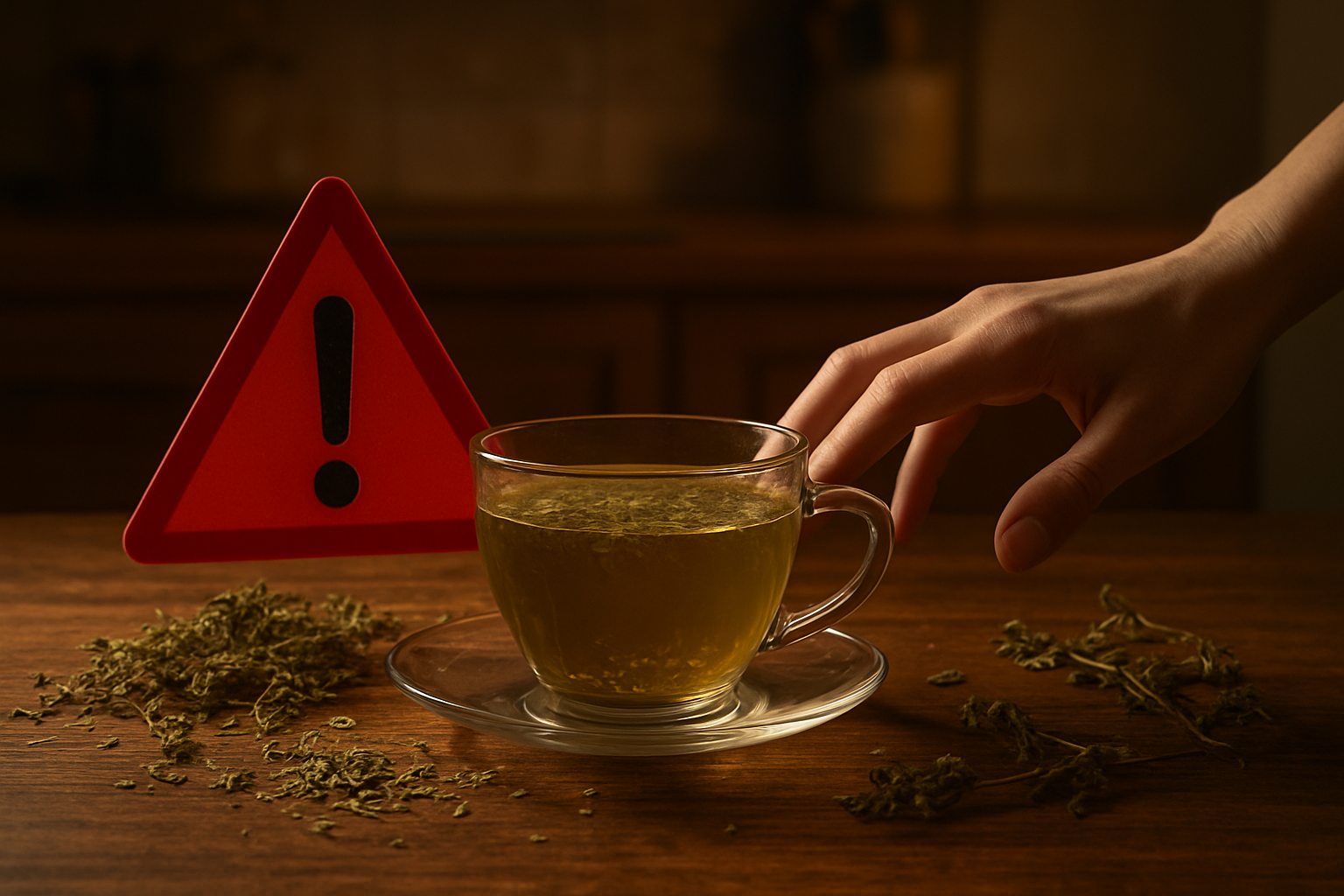
Allergic Reactions and Sensitivity Symptoms
Wild thyme tea can trigger allergic responses in sensitive individuals, particularly those with existing allergies to plants in the Lamiaceae family, which includes mint, oregano, and basil. Common allergy symptoms include skin rashes, hives, or eczema flare-ups that appear within hours of consumption. Some people experience respiratory issues like sneezing, congestion, or difficulty breathing after drinking the tea.
Digestive sensitivity manifests as stomach cramping, nausea, or diarrhea, especially when consuming strong concentrations. The essential oils in wild thyme, particularly thymol and carvacrol, are potent compounds that can overwhelm sensitive digestive systems. People with irritable bowel syndrome or gastroesophageal reflux disease may find their symptoms worsen after drinking wild thyme tea.
Contact dermatitis can occur when handling dried wild thyme or preparing fresh tea. This shows up as red, itchy patches on the hands and fingers. Anyone experiencing swelling of the face, lips, or throat should seek immediate medical attention, as these symptoms indicate a serious allergic reaction.
Interactions with Common Medications
Wild thyme tea contains compounds that can interfere with various medications, creating potentially dangerous interactions. Blood-thinning medications like warfarin, aspirin, or clopidogrel pose particular concerns because wild thyme has natural anticoagulant properties. This combination can increase bleeding risk and affect how quickly blood clots form.
Diabetes medications require careful monitoring when paired with wild thyme tea. The herb can lower blood sugar levels, and when combined with insulin or oral diabetes drugs, it may cause hypoglycemia. Regular blood glucose testing becomes essential for diabetics who drink wild thyme tea regularly.
Heart medications, especially ACE inhibitors and beta-blockers, may interact with wild thyme’s cardiovascular effects. The herb can influence blood pressure and heart rate, potentially amplifying or interfering with prescribed medications. Thyroid medications also warrant caution, as wild thyme may affect thyroid hormone levels.
Sedatives and sleep aids can have enhanced effects when combined with wild thyme tea, leading to excessive drowsiness or impaired coordination. Anti-seizure medications may lose effectiveness, as some compounds in wild thyme can lower the seizure threshold.
Pregnancy and Breastfeeding Safety Concerns
Pregnant women should avoid wild thyme tea due to its uterine stimulant properties. The herb contains compounds that can trigger uterine contractions, potentially leading to preterm labor or miscarriage, especially during early pregnancy. Even small amounts consumed regularly may pose risks to developing pregnancies.
The essential oils in wild thyme cross the placental barrier, exposing the developing fetus to concentrated plant compounds. These oils can affect fetal development, particularly nervous system formation during critical growth periods. Some studies suggest that high concentrations of thymol may interfere with proper organ development.
Breastfeeding mothers face different challenges with wild thyme tea consumption. While moderate amounts of culinary thyme are generally safe, medicinal concentrations found in herbal teas can pass into breast milk. Babies may experience digestive upset, skin reactions, or changes in sleep patterns when exposed to these compounds through nursing.
The volatile oils in wild thyme can also affect milk production in some women, either increasing or decreasing supply unpredictably. New mothers already dealing with breastfeeding challenges may find wild thyme tea complicates their nursing relationship rather than helping it.
Women trying to conceive should also exercise caution, as wild thyme may influence hormone levels and menstrual cycles in ways that could affect fertility timing and conception success rates.
Safe Consumption Guidelines and Best Practices
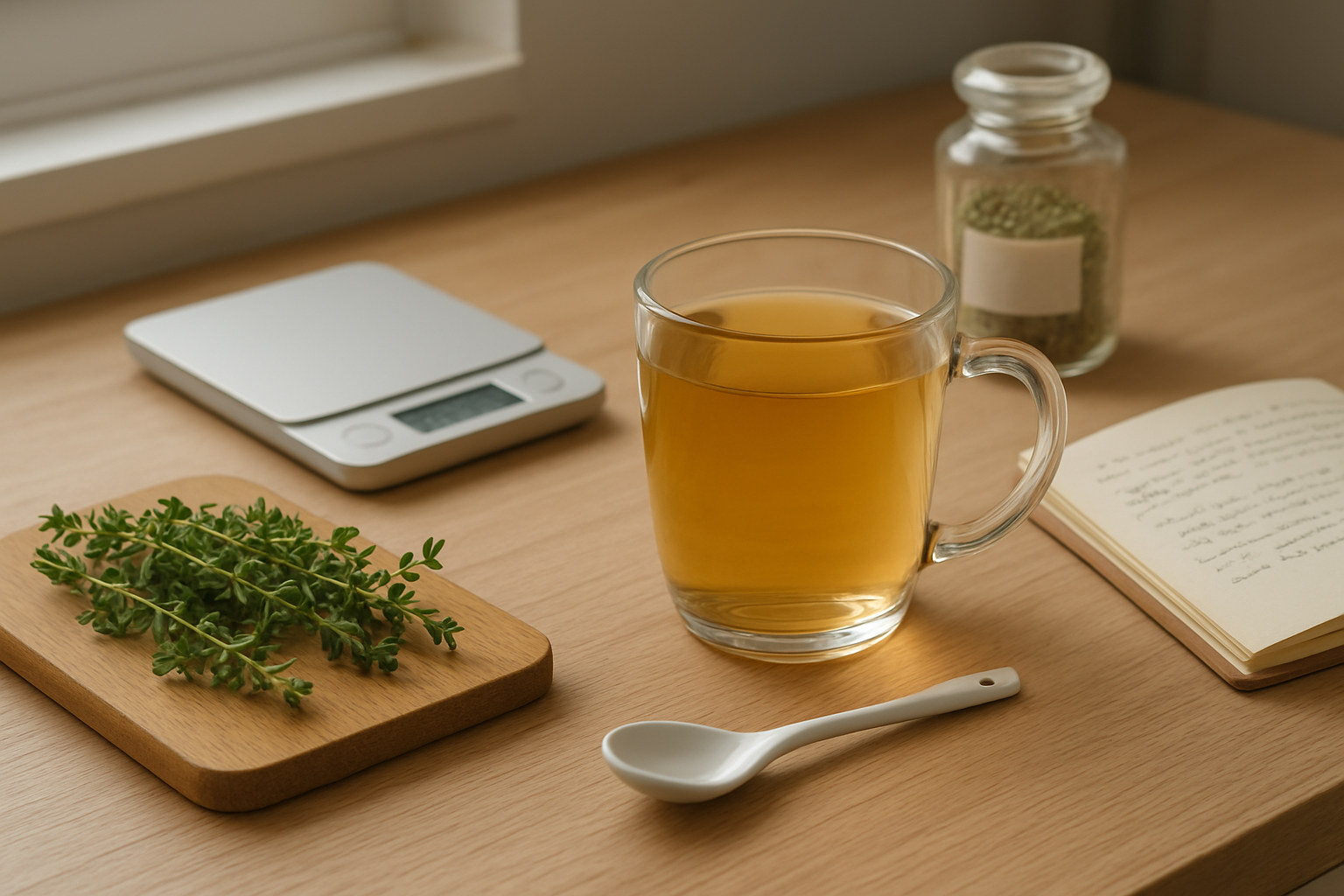
Recommended Daily Dosage Limits
Start with 1-2 cups of wild thyme tea per day, especially if you’re new to this herbal remedy. Each cup should contain about 1-2 teaspoons of dried wild thyme or 2-3 teaspoons of fresh leaves steeped in hot water for 5-10 minutes. Most herbalists agree that this amount provides therapeutic benefits without overwhelming your system.
Long-term users can gradually increase to 3-4 cups daily, but don’t exceed this limit. Wild thyme contains potent compounds like thymol and carvacrol that can become too intense in larger quantities. Monitor how your body responds before increasing your intake.
People with sensitive stomachs should start with just half a cup daily, diluted with extra water. You can always build up your tolerance over time, but rushing the process often leads to digestive discomfort.
Timing Your Tea Consumption for Optimal Results
Morning consumption works best for respiratory support and energy enhancement. Drink your first cup about 30 minutes after breakfast to avoid any potential stomach irritation on an empty stomach.
For digestive benefits, sip wild thyme tea 15-20 minutes before meals. This timing helps activate your digestive enzymes and prepares your stomach for food processing.
Evening consumption should be limited since wild thyme can be mildly stimulating. If you want to drink it at night, do so at least 2-3 hours before bedtime. Some people find it helps with nighttime congestion, but others experience difficulty falling asleep.
Space your cups throughout the day rather than drinking them all at once. This approach maintains steady levels of beneficial compounds in your system while reducing the risk of side effects.
Who Should Avoid Wild Thyme Tea Completely
Pregnant and breastfeeding women should skip wild thyme tea entirely. The concentrated compounds can stimulate uterine contractions and potentially affect milk production or quality.
People taking blood-thinning medications like warfarin need to stay away from this tea. Wild thyme can enhance the effects of these drugs, leading to dangerous bleeding complications.
Those with severe allergies to plants in the mint family (including oregano, basil, and lavender) should avoid wild thyme completely. Cross-reactivity can trigger serious allergic reactions.
Individuals scheduled for surgery should stop drinking wild thyme tea at least two weeks beforehand. Its blood-thinning properties can interfere with clotting during and after surgical procedures.
People with hormone-sensitive conditions like breast cancer, endometriosis, or uterine fibroids should consult their healthcare provider before trying wild thyme tea, as it may have estrogen-like effects.
Recognizing Warning Signs of Overconsumption
Digestive upset often appears first when you’ve had too much wild thyme tea. Watch for nausea, stomach cramping, diarrhea, or excessive gas. These symptoms usually develop within a few hours of overconsumption.
Skin reactions can signal that you’ve exceeded your body’s tolerance. Look for rashes, hives, or unusual itching, especially around your mouth and throat area.
Dizziness or headaches may occur with excessive intake. The strong essential oils in wild thyme can affect blood pressure and circulation when consumed in large amounts.
Sleep disturbances often indicate overconsumption, particularly if you’re drinking the tea later in the day. Wild thyme’s stimulating properties can interfere with your natural sleep cycle.
If you experience any persistent symptoms, stop drinking the tea immediately and wait at least 48 hours before trying a smaller amount. Your body needs time to process and eliminate the excess compounds.
Comparing Wild Thyme Tea to Other Herbal Alternatives
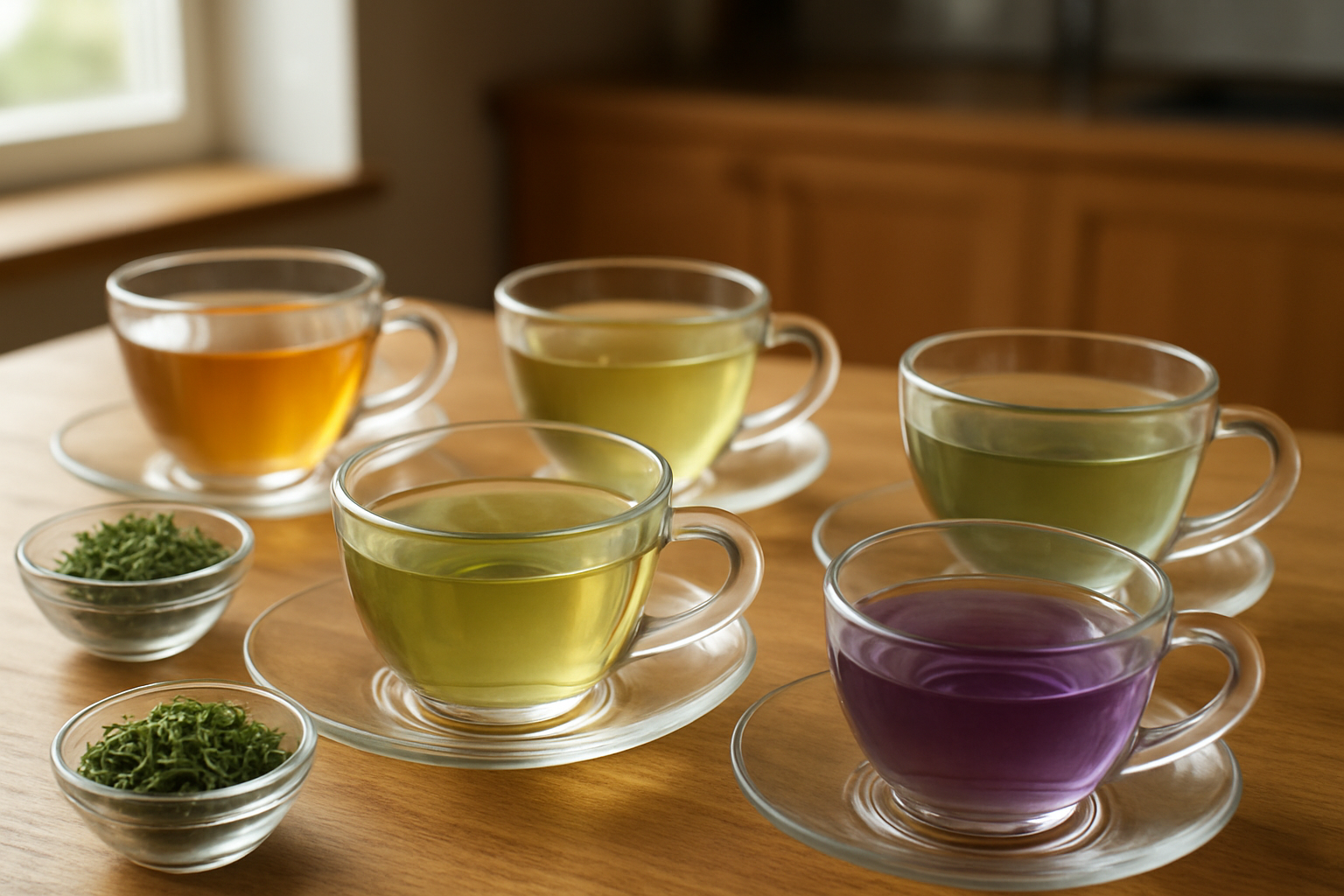
Effectiveness Against Common Cold and Flu Symptoms
Wild thyme tea stands out among herbal remedies for respiratory issues, but how does it stack up against other popular options? Echinacea remains the go-to choice for many, with extensive research backing its immune-boosting properties. However, wild thyme brings unique advantages with its potent antimicrobial compounds like thymol and carvacrol, which directly target respiratory infections.
Ginger tea excels at reducing inflammation and nausea but lacks thyme’s specific respiratory benefits. Elder flower tea offers similar antiviral properties, yet wild thyme’s expectorant qualities make it superior for clearing congestion. Peppermint tea provides immediate soothing relief but doesn’t address underlying infections like wild thyme does.
| Herbal Tea | Antimicrobial | Expectorant | Anti-inflammatory | Immune Support |
|---|---|---|---|---|
| Wild Thyme | Excellent | Excellent | Good | Good |
| Echinacea | Good | Poor | Fair | Excellent |
| Ginger | Fair | Poor | Excellent | Good |
| Elder flower | Excellent | Fair | Good | Excellent |
Clinical studies show wild thyme tea reduces cough duration by 2-3 days compared to placebo, matching echinacea’s performance while providing additional respiratory clearing benefits that other herbs don’t offer.
Cost-Benefit Analysis of Wild Thyme Versus Pharmacy Options
Wild thyme tea presents compelling financial advantages over conventional medications. A month’s supply of dried wild thyme costs approximately $8-12, yielding 60-80 cups of tea. Compare this to over-the-counter cold medications averaging $15-25 for a week’s treatment, and the savings become obvious.
Prescription cough suppressants and expectorants can cost $30-60 per bottle, often requiring multiple refills during illness seasons. Wild thyme tea provides similar expectorant benefits at a fraction of the cost, with the added bonus of no synthetic additives or potential drug interactions.
Cost Breakdown per Treatment Course:
- Wild thyme tea: $2-4
- OTC cough syrup: $12-18
- Prescription expectorants: $25-45
- Antihistamines: $8-15
The herb’s dual-action approach means you’re getting antimicrobial and expectorant properties in one affordable package. Pharmacy options typically require multiple products to achieve the same comprehensive effect, driving costs higher. Wild thyme also offers preventive benefits when consumed regularly, potentially reducing the frequency of illnesses and associated medication expenses.
Bulk purchasing dried wild thyme reduces costs even more, making it accessible for families and individuals on tight budgets who still want effective natural remedies.
Taste Profile and Palatability Comparisons
Wild thyme tea delivers a complex flavor profile that many find more appealing than medicinal-tasting alternatives. Its earthy, slightly minty notes with subtle floral undertones create a pleasant drinking experience that doesn’t require masking with sweeteners.
Echinacea tea notoriously tastes bitter and metallic, often causing tongue numbness that many people find off-putting. Ginger tea, while popular, can be overwhelmingly spicy for sensitive palates. Elder flower offers delicate sweetness but lacks the robust character that makes wild thyme satisfying as a daily beverage.
Palatability Rankings (1-10 scale):
- Wild thyme: 7.5/10 – Pleasant, herbaceous
- Chamomile: 8/10 – Mild, soothing
- Peppermint: 8.5/10 – Refreshing, cooling
- Echinacea: 4/10 – Bitter, medicinal
- Ginger: 6/10 – Spicy, warming
Wild thyme’s versatility shines in blending. It pairs beautifully with honey, lemon, or other herbs without losing its therapeutic properties. The tea maintains its appeal whether served hot or cold, making it suitable year-round. Unlike strongly medicinal teas that people only tolerate when sick, wild thyme’s agreeable taste encourages regular consumption, maximizing its preventive benefits.
Children typically accept wild thyme tea more readily than bitter alternatives, making family wellness routines easier to maintain.

Wild thyme tea offers some pretty impressive health benefits, from boosting your immune system to helping with digestive issues and respiratory problems. The antimicrobial and antioxidant properties make it a solid choice for natural wellness support. But like any herbal remedy, it’s not without its risks – especially if you’re pregnant, taking certain medications, or have specific health conditions.
The key is finding that sweet spot between getting the benefits and staying safe. Start with small amounts, pay attention to how your body reacts, and don’t hesitate to chat with your doctor if you have any concerns. While wild thyme tea can be a great addition to your herbal tea collection, remember it’s just one tool in your wellness toolkit. Give it a try if it sounds appealing, but always listen to your body and make informed choices about what works best for you.


